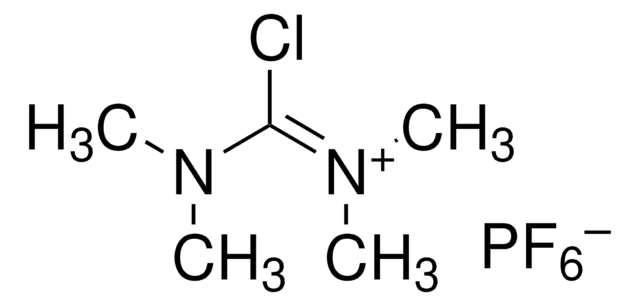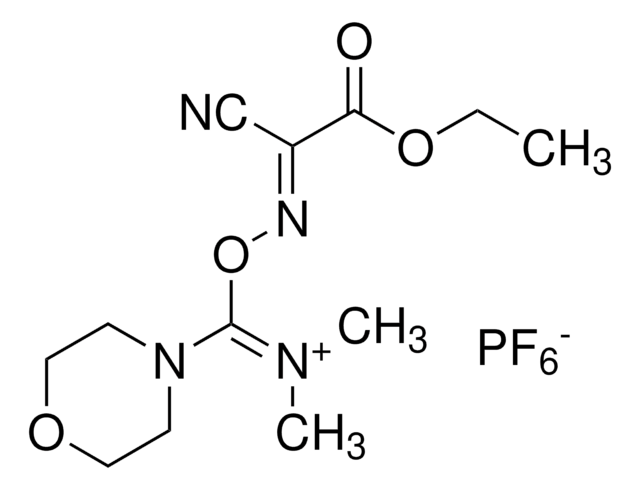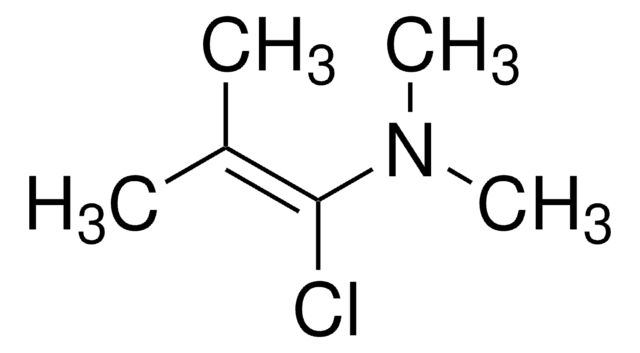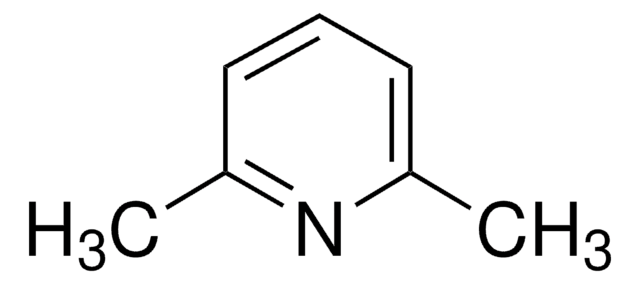198005
2-Chloro-1-methylpyridinium iodide
97%
Synonym(s):
Mukaiyama reagent
Sign Into View Organizational & Contract Pricing
All Photos(2)
About This Item
Empirical Formula (Hill Notation):
C6H7ClIN
CAS Number:
Molecular Weight:
255.48
Beilstein:
3572320
EC Number:
MDL number:
UNSPSC Code:
12352100
PubChem Substance ID:
NACRES:
NA.22
Recommended Products
Quality Level
Assay
97%
mp
200 °C (dec.) (lit.)
functional group
chloro
SMILES string
[I-].C[n+]1ccccc1Cl
InChI
1S/C6H7ClN.HI/c1-8-5-3-2-4-6(8)7;/h2-5H,1H3;1H/q+1;/p-1
InChI key
ABFPKTQEQNICFT-UHFFFAOYSA-M
Looking for similar products? Visit Product Comparison Guide
General description
2-Chloro-1-methylpyridinium iodide (Mukaiyama reagent), is a commonly used reagent in organic synthesis for the activation of the hydroxy group of alcohols and carboxylic acids. It is used to synthesize derivatives of esters, lactones, amides, lactams, and ketenes from the corresponding carboxylic acids. It is also used as an efficient coupling reagent in the synthesis of peptides because of its low toxicity, simple reaction conditions, and also less expensive than EDC.
Application
2-Chloro-1-methylpyridinium iodide (CMPI) can be used as:
- A dehydrating agent for the conversion of various aldoximes to nitriles, and alcohols into alkyl thiocyanates.
- A cross-linking agent to fabricate biodegradable cross-linked hyaluronic acid film and gelatin membranes for biomedical applications.
- A condensing agent to synthesize various β-lactams from β-amino acids.
Storage Class Code
11 - Combustible Solids
WGK
WGK 3
Flash Point(F)
Not applicable
Flash Point(C)
Not applicable
Personal Protective Equipment
dust mask type N95 (US), Eyeshields, Gloves
Choose from one of the most recent versions:
Already Own This Product?
Find documentation for the products that you have recently purchased in the Document Library.
Customers Also Viewed
A convenient method for the construction of β-lactam compounds from β-amino acids using 2-chloro-1-methylpyridinium iodide as condensing reagent
Huang H, et al.
Chemistry Letters (Jpn), 13(8), 1465-1466 (1984)
A novel cell support membrane for skin tissue engineering: Gelatin film cross-linked with 2-chloro-1-methylpyridinium iodide
Yeh Ming-kung, et al.
Polymer, 52(4), 996-1003 (2011)
Ming-Kung Yeh et al.
Journal of biomaterials science. Polymer edition, 23(7), 973-990 (2011-05-10)
We prepared a novel porous gelatin (GEL) sponge which was cross-linked (CL) with a zero-length crosslinker of 2-chloro-1-methylpyridinium iodide (CMPI), and compared CPMI with 1-ethyl-3,3-dimethylaminoproplycarbodiimide (EDC). The ninhydrin assay indicated that the CMPI-CL-GEL sponge had a higher degree of cross-linking
Dmitrii V Belykh et al.
Molecules (Basel, Switzerland), 23(7) (2018-07-18)
This article focuses on the antiradical activity of a number of 2,6-diisobornylphenol-porphyrin conjugates with various spacers between the porphyrin and phenolic fragments in the model reaction of ethylbenzene oxidation initiated by azoisobutyric acid dinitrile. The study has shown that the
Jenn-Jong Young et al.
Journal of biomaterials science. Polymer edition, 15(6), 767-780 (2004-07-17)
In order to obtain much slower biodegradable films, which are often required for biomedical applications, we have developed a series of studies on heterogeneous cross-linking of hyaluronic acid (HA) films by using 2-chloro-1-methylpyridinium iodide (CMPI) or 1-ethyl-(3,3-dimethylaminopropyl)carbodiimide (EDC) as cross-linking
Our team of scientists has experience in all areas of research including Life Science, Material Science, Chemical Synthesis, Chromatography, Analytical and many others.
Contact Technical Service









